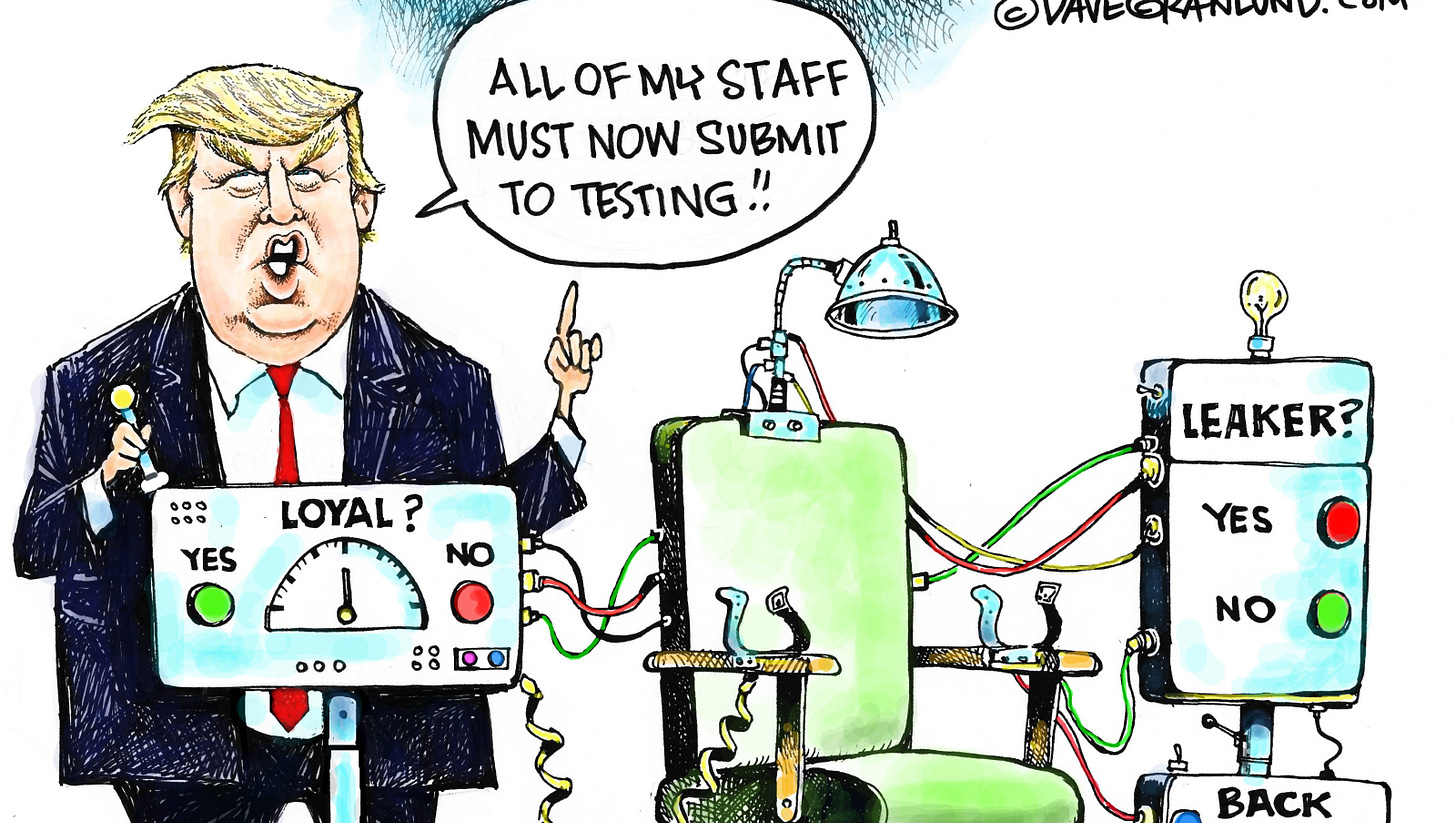Trump's Broken Things / What We Know About Political Loyalty
Some Lessons from the Study of Authoritarian Politics
Dear Reader,
When Trump got elected, I felt there were basically two broader possibilities for his second term. The best case scenario is that we get some version of inept, corrupt government, with Trump handing out favors to his buddies, and those buddies in turn gutting the core of the bureaucracy and playing out their conservative fantasies. This would be a damaging four years, but as the damage mounted, the MAGA movement would be undermined and normalcy could eventually be restored through the electoral process.
The worst case scenario is something resembling real “democratic backsliding,” where Trump continues to attack the core institutions of democracy, to the point where the next election is no longer free and fair, and we transition as a system to something resembling competitive authoritarianism. As a form of government, democracy is in a deep recession worldwide, and we’ve seen many countries now elect themselves out of democracy by empowering populist strongmen, who in turn change the rules of the game. “Protect democracy” did not work as an electoral strategy for Harris-Walz, but that does not mean that the spirit of that concern was wrong.
Of late I can’t help but find parallels between Trump’s political strategies and what we observe in China, Russia, and elsewhere in the authoritarian world. So I thought it would be useful to write some pieces over the next few months that outline some of the core theoretical insights from research on authoritarianism.
First up: what do we know about political loyalty?
Last week I wrote about the distinct personality type of Trump’s political appointees— the “low-H” personality. But there is another unifying feature of these people that is worth pointing out— many of them are “broken things” of various sorts, political untouchables that, without Trump, would have no meaningful political careers. Folks like Gaetz, Hegseth, Gabbard and now Patel owe everything to Trump, and for that reason they will do whatever he wants them to do. They would not be anywhere near power if it weren’t for him. This is not a “team of rivals” or an assembly of technocratic talent, but a team of henchmen. Trump protects them and elevates them in exchange for unconditional loyalty, and he seems to be deliberately selecting people with baggage that would normally be disqualifying.
We see this sort of damage-breeds-loyalty dynamic in other political and social systems. It makes me think of criminal gangs, which force new members to commit heinous crimes in order to bind them to the group, some even getting certain facial tattoos to ruin their prospects on the normal job market. In authoritarian regimes, we see high levels of corruption by members of the ruling coalition, which again serves to bind them together like glue. When members of a group are mutually implicated in wrongdoing, they have no choice but to stay loyal and stick together.
Image Credit: Times Record
Of course, there are people floating around the Republican party that do maintain independent bases of support and may still have political futures of their own— folks like Marco Rubio or Ted Cruz come to mind. These are the not-so-broken things, and there we see a different loyalty dynamic at play, what China scholars would refer to as “nauseating displays of loyalty.” This term was coined by Victor Shih from UCSD in a classic paper in the China field. The basic idea is that to signal loyalty to a patron, lower level officials in China would engage in over-the-top acts of sycophancy that would make them despised by others in the system, but in turn would convince the patron that they he basically owned them. In other words, there is political value in debasing oneself.
Time and time again, we’ve seen Republican elites bend the knee to Trump, often in distinctly embarrassing ways— recall Ted Cruz phone banking for Trump after he called his wife ugly, or the slew of Republican elites that came to visit Trump during the Stormy Daniels hush money trial. These types of actions are a way for the patron and client to bond their political fates together. Those unwilling to debase themselves— the Mitt Romneys of the world— are cast aside.
In general, political loyalty matters and most leaders want it, but it seems to matter more in authoritarian systems because the stakes of the political game are higher. When dictators lose power, they are rarely left to just go play golf. Xi Jinping has spent the last ten years ridding the highest levels of the CCP of anyone outside of his own faction. Trump is effectively trying to do the same for the GOP.
My hypothesis would be that there is a higher premium on loyalty in corrupt democracies or democracies in the process of backsliding, because those in government plan to engage in illicit, rule-breaking, norm-bending behavior. The leader needs lieutenants that won’t rat or defect, which was a problem Trump faced in his first term. I worry that his renewed focus on loyalty is a harbinger of what’s to come.
That’s all for today. Thank you for reading. If this was useful to you, please do pass along to others by forwarding the email or pressing the share button. Right now I’m mostly writing for my mom and I’d like to grow the ol’ audience a bit. Hi Mom.
Rory





Hi Ror
Great analysis Rory! Long time no speak, great to see you on substack